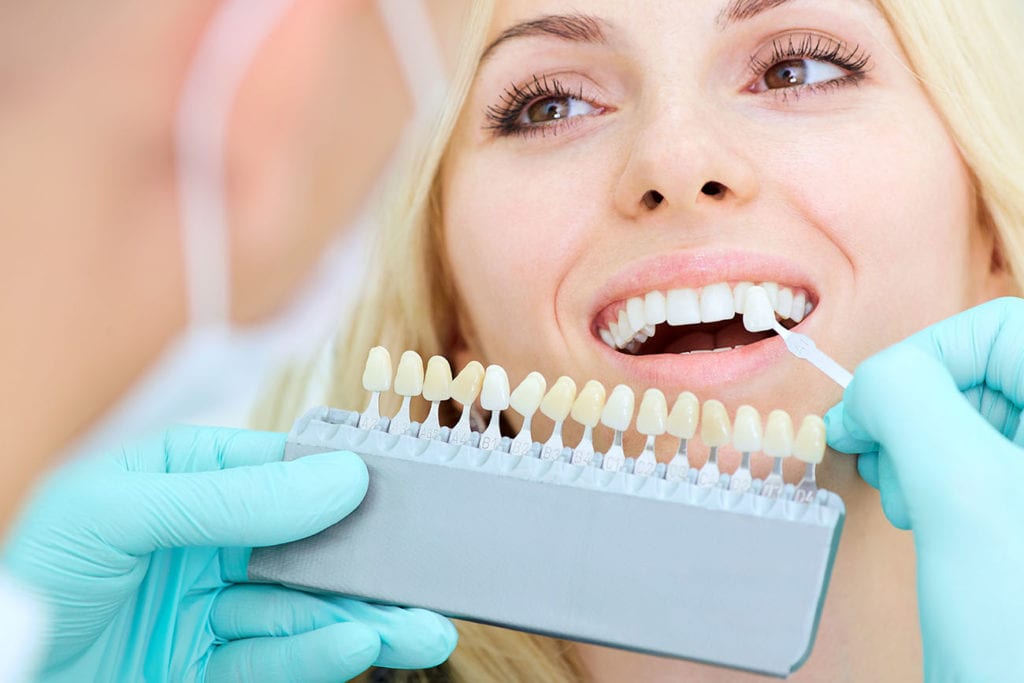Do you have stained, damaged, or discolored teeth? Tooth bonding is a cosmetic dental procedure in our Hoffman Estates, IL office that can improve the aesthetics of damaged teeth. This treatment can help rebuild the tooth structure and lighten the appearance of teeth by several shades.
Dental bonding uses a long-lasting composite resin that we adhere and shape to teeth. We color-match this material and ensure it matches your tooth shape.

What Does Dental Bonding Treat?
Bonding can treat many cosmetic problems. Tooth bonding can address the following:
- Chipped teeth
- Cracked or broken teeth
- Fractured teeth
- Stained teeth
- Discolored teeth
- Misshapen teeth
- Gaps between teeth
Bonding is an alternative to veneers that cover discolored and damaged teeth with tooth-colored materials. We often recommend bonding if you have a chipped or cracked tooth. Teeth bonding can also cover a stained tooth in your smile zone.
The Benefits of Dental Bonding
Dental bonding is one of the easiest and most affordable ways to improve the appearance of your teeth. This cosmetic procedure uses a tooth-colored resin to repair chips, cracks, discoloration, and gaps. It can also reshape teeth and make them look longer or more even. Dental bonding is quick, painless, and provides long-lasting results.
Improves the Appearance of Your Smile
One of the most significant benefits of dental bonding is its ability to enhance the look of your teeth. The resin material is custom-matched to your natural tooth color, creating a seamless and natural appearance. Bonding can quickly correct these issues if small gaps, misshapen teeth, or stains don’t respond to whitening. Your smile can look brighter and smoother even during one visit.
Quick and Painless Procedure
Unlike other cosmetic treatments that require multiple visits, dental bonding can usually be completed in one appointment. The procedure is simple and doesn’t require anesthesia unless it’s being used to fill a cavity. The dentist will apply the resin, shape it to match your tooth, and harden it with a special light. The entire process typically takes less than an hour per tooth, making it one of the fastest ways to improve your smile.
Affordable Compared to Other Cosmetic Treatments
Dental bonding is one of the most cost-effective cosmetic dental procedures available. It provides an affordable alternative to veneers and crowns while offering excellent results. Bonding is a great option to enhance your smile without spending much money. Many dental insurance plans also cover bonding if it’s done for restorative purposes, such as fixing a chipped tooth.
Preserves More of Your Natural Tooth
Unlike crowns or veneers, which require the removal of some tooth enamel, dental bonding keeps most of your natural tooth intact. The resin is applied directly to the tooth’s surface without altering its structure. This makes bonding a conservative treatment that strengthens and protects your teeth while improving their appearance.
Repairs and Protects Damaged Teeth
Chipped or cracked teeth are cosmetic concerns and can lead to further damage if left untreated. Dental bonding reinforces weak areas of a tooth, preventing fractures from worsening. The resin material bonds securely to the enamel, adding strength and durability. This helps protect your teeth from future wear and tear.
Treatment with Tooth Bonding in Hoffman Estates, IL
Dr. Patel will clean your smile and prepare the tooth or teeth receiving the tooth bonding material. Tooth preparation entails removing a small part of the tooth structure. Preparation allows the composite resin to adhere to the surface of your teeth. The preparation will not hurt because we remove so little of the tooth structure for the bonding material.
Then, our dentist applies the resin and shapes it to the tooth, matching the natural contours of the smile. Our dentist cures the tooth using a special bonding light. Finally, our dentist shines the tooth for a natural and brighter look. Air abrasion may fix any imperfections.
After you complete dental bonding treatment, schedule regular dental checkups to maintain the health and appearance of your smile. Caring for your bonded tooth will ensure your results stay bright and natural-looking.
Tooth Bonding FAQs
Learn more about tooth bonding by reading answers to patients’ common questions about their bonding treatment below.
How long does tooth bonding last?
Depending on the tooth’s location, tooth bonding can last 4 to 8 years. However, remember that it’s not as permanent as its counterpart, porcelain veneers. To maintain your tooth bonding results for as long as possible, follow these tips:
- Practice good oral hygiene. Brush your teeth twice a day using a soft-bristle toothbrush and fluoride toothpaste. Floss at least once daily to remove plaque and debris between your teeth and along your gum line.
- Avoid foods and drinks that may stain your teeth. Dark-colored beverages like coffee, tea, red wine, and soda can stain your bonded teeth. Limit your intake of highly pigmented foods like berries and tomato-based sauces.
- Quit smoking. Smoking can cause discoloration and stains on bonded teeth and impact the overall health of your teeth and gums.
- Be mindful of what you bite or chew. Avoid biting hard objects like ice, pens, or fingernails, as they can damage the bonding material. Similarly, avoid chewing on hard or sticky foods that may cause the bonding to chip or come loose.
- Protect against grinding and clenching. If you grind your teeth or clench your jaw, consider wearing a mouthguard at night to protect your teeth and bonding. These habits can pressure your bonded teeth and weaken the bonding material.
- Continue regular dental visits. Visit your dentist for regular checkups and professional cleanings. They can assess the condition of your bonding and make any necessary repairs or touch-ups.
- Report any issues to your dentist promptly. If you notice any changes in the appearance or integrity of your bonding, such as chipping, roughness, or discoloration, visit your dentist as soon as possible to address the issue before it worsens.
Does tooth bonding hurt?
Tooth bonding does not hurt, as the treated area is not sensitive. You will not feel pain during the procedure, and you should not feel any discomfort at all after the treatment. We can numb your tooth before bonding treatment.
Does tooth bonding break easily?
The tooth-bonding biocomposite material is not easily breakable unless you clench or grind your teeth. If you suffer from bruxism or teeth grinding, tell Dr. Patel. He can help treat the condition at the source.
Can you eat normally with dental bonding?
After the bonding procedure, patients should immediately avoid eating any hard or chewy foods. After a few days, patients may start to slowly experiment with the strength and capabilities of their bond. It takes a week or two to adjust to eating normally and adjust to the feeling.
Is dental bonding good for my teeth?
Ultimately, dental bonding can protect your teeth and prevent further tooth damage. If you already have a worn or cracked tooth, you may sustain damage from biting and chewing. Tooth wear and damage can increase the risk of harmful bacteria entering and affecting the tooth. Bonding adds a protective layer, creating a more balanced and aesthetically pleasing smile.
How do I care for my composite bond?
Patients with bonds are told to avoid foods and drinks that may stain them. These include tomatoes, tea, coffee, wine, candy, etc. They also should practice a strong and consistent oral care routine and schedule regular dental cleanings.
Patients with tooth bonding should also avoid smoking and drinking through straws if possible. The sucking motion used during smoking or sipping through straws can damage the bonding material.
Repair Teeth Today
Fix chips, cracks, and other signs of tooth damage with dental bonding. Call 847.660.6603 for comfortable tooth bonding treatment at Best Dental Spa in Hoffman Estates, IL. You can also schedule an appointment with Dr. Patel online today.
Let us know if you have any questions for our office; we are here to help you find the best treatment for your smile.
